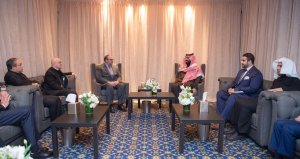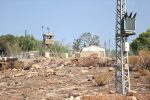Saudi Crown Prince forges ahead against extremism
Saudi Crown Prince Mohammed bin Salman (MBS) is taking a realistic approach to the Middle East as he bolsters the voices of moderates, challenges the extremists and pushes for a realistic peace accord between Israel and Palestine. The tactic MBS is pursuing is one that few Arabs have pursued but failed. Published in the Arab News April 11, 2018
By Ray Hanania
The Arab World listened intently to Barack Obama six months after he was sworn in as president when he outlined his “new beginning” in relations with the “Muslim World” in his famous “Cairo speech.”
Obama didn’t address the “Arab World.” He addressed the “Muslim World” for a reason that many Arabs would not fully understand until years later. Obama wasn’t trying to lift the Arab World up and bring peace to the Middle East. He was instead seeking to elevate Iran’s influence into the region.
By the time Arabs realized what was happening, it was too late. Obama had abandoned the Arab Word by turning his back on promises of freedom for Palestinians, and he backed an unprecedented policy to bolster Iran allowing it to pursue nuclear technology.
The fact is more Palestinians were killed and wounded under Obama’s watch than under any previous American president. Clearly, Obama’s perceived compassion for Palestinian rights was undermined by the reality.

And that was because Obama was more concerned about the interests of Iran. Instead of curtailing Iran’s regional hegemony, Obama was fueling it at the expense of the Arab World.
As president, Obama struggled to put Saudi Arabia in check, in order to elevate Iran. One of the president’s most influential advisers was Valerie Jarrett, his longest serving aide. Jarrett was born and raised in Shiraz, Iran, and enjoyed a particular love for Iranian culture that had vanished under the oppressive rule of the Ayatollahs and the conflict with the West.
When Trump was elected, he slammed the door on Iran encouraging moderate Arab World leaders who faced two major but distinct challenges. The first was the drive to stop Iran’s meddling in Arab World affairs. The second is endless Palestine conflict with Israel.
There is an achievable although elusive goal in seeking compromise with Israel. But the fanaticism of Iran presents the Arab World only with destruction. That is what has defined Saudi Arabia’s foreign policy as crafted by its new voice, Crown Prince Mohammed bin Salman (MBS) and it has put the extremists on notice.
Many Palestinians have reacted with anger to the Crown Prince’s actions, but that’s because after 70 years of living under a brutal Israeli oppression, and failed Palestinian leadership, anger is all they have left.
Someone with their best interests in mind must shake Palestinians out of their suicidal nose-dive and force them to see reason. Palestinians can’t keep “rejecting” the inevitable. It’s one thing to dream of the past. It’s another to live in the present.
MBS clearly plans to help Palestinians achieve statehood, maybe not one that fully realizes their demands, and then leave it up to them to evolve into justice.
It’s a challenge, of course. You can’t take 70 years of injustice and oppression and expect it to miraculously blossom into paradise.
MBS was straightforward in speaking about Palestine, although the extremists have cast his words as betrayal.
Rather than sit down for a sugarcoated interview with pro-Palestinian media, MBS walked into the Lion’s den of pro-Israel bias, allowing an interview with The Atlantic Magazine’s Jeffrey Goldberg, a pro-Israel extremist with a history of anti-Palestinian writing.
Despite Goldberg’s prodding, MBS stood his ground on Palestine and on Israel. MBS spoke about a reality many Palestinian activists don’t want to hear. But his words appeal to Palestinians who aspire to a freedom from Israeli oppression.
MBS clearly defined a path to Palestinian statehood in his reasoned responses to Goldberg’s queries, which were published April 2.
Asked about the right of Jews to have their own “nation-state,” MBS said all people have “a right to live in their peaceful nation. I believe the Palestinians and the Israelis have the right to have their own land.” But, we must have a peace accord, he said, to assure normal relations.”
Goldberg pressed if MBS has a religious-based objection to Israel, MBS responded, “We have religious concerns about the fate of the holy mosque in Jerusalem and about the rights of the Palestinian people.” Adding, “We don’t have any objection against any other people.”
MBS repeated Arabs do not have “a problem with Jews.” He said Christians, Muslims and Jews face the same problems in this world.
The question that made headlines and stirred criticism, though, came in the context of who is worse, Israel or Iran. “Israel is a big economy compared to their size and it’s a growing economy, and of course there are a lot of interests we share with Israel and if there is peace, there would be a lot of interest between Israel and the Gulf Cooperation Council countries and countries like Egypt and Jordan,” MBS responded.
Goldberg is not popularly read in the Arab World, and the exaggerated criticism received much mileage. Some asserted that the interview was ill-timed coming in the wake of Israel’s killing of dozens of Palestinians in Gaza.
Few of the Crown Princes’ critics will acknowledge that Gaza is under the heel of Hamas and the Muslim Brotherhood extremists who reject peace with Israel believing that continued conflict, despite the continued death toll, is a better option that might one day result in Israel’s destruction.
But Israel’s destruction won’t happen. While many Palestinians can’t see the reality of today through the violent vision of their many extremist activists, MBS sees the future clearly.
Peace is possible if we recognize that Israelis and Palestinians are diverse peoples. You can see a future both for Israel and Palestine, and an end to the suffering. But only through pragmatic reasoning and confidence that moderation and dialogue achieve far more than hate-driven anger and extremist rhetoric.
(Ray Hanania is a Palestinian American columnist, veteran political journalist and author of several books, including “Power PR” and “Yalla! Fight Back.” Reach him through his website at www.Hanania.com.)


- Israelisnipers shooting and killing hospital workers in Gaza - December 11, 2023
- CAIR Condemns Israeli Executions of Wounded, Unarmed Palestinian in West Bank - December 11, 2023
- Arab and Muslim American voters face a “simple choice” between Biden’s inhumanity and Trump’s edgy politics - December 9, 2023
























